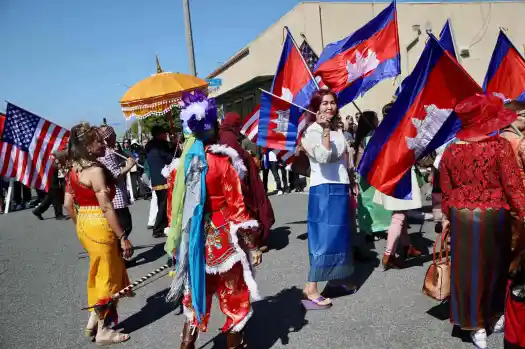
Cambodian Americans continue to face pressures and injustices in today’s society.
They have been targets of prejudice, bigotry, racism, institutionalized inequality in the labor market, social injustice, and political disenfranchisement. Poverty is a common issue due to few transferable job skills, lack of fluency in English, severe trauma, inexperience in urban environments, and physical disabilities due to the war. Many Cambodians struggle to resuscitate their culture from memory because the Khmer Rouge had thoroughly destroyed all important facets of Cambodian society. Thus, many are deeply compelled to revive Cambodian dance, music, art, religion, and social mores due to these facets’ demise under the Khmer Rouge regime. Additionally, Cambodian American culture has seen itself negotiating and melding different cultural traditions. For example, Confucian philosophy mandates hierarchical social relations that have become deeply entrenched in the culture. Thus, women in Southeast Asia are still expected to be submissive and respectful to men and older people.
Post-traumatic stress disorder is a serious affliction in communities. The disorder “reactivated” when Cambodian Americans witnessed the aerial attacks on the Twin Towers and the Pentagon. Children who did not live through the horrors of the Khmer Rouge era still find themselves growing up in households in which one or more adults are suffering from PTSD, and these kids are affected by it in their own way. There are very few programs to address this PTSD; Buddhist monks offer counsel and support, which contributes to why many Cambodians seek to live near a Buddhist temple.
Many refugees ended up in inner-city neighborhoods where gang warfare has been rampant, due to the imperative to find “cheap” housing. As a result of this, Cambodian youth established gangs of their own in order to protect themselves, thus causing gang violence to become a rampant problem in this community. Young Cambodian Americans have used forms of popular culture, such as hip hop, to tell their stories about war, genocide, and justice. It is estimated that 30 to 70 percent of Cambodian refugee families had female heads of the household due to male family members being killed. Many of these women had it the hardest upon arrival in the U.S., because they had to stay home to take care of their children and therefore could not enroll in ESL (English as a Second Language) classes.
The term “Pol Pot time” is used by refugees to describe this incredibly tumultuous, traumatic, and turbulent period. “To be Khmer is to be Buddhist” – that religion and its precepts are infused into every facet of life among people of Cambodian ancestry. The Cambodian definition of “Success” stems from the Theravada Buddhist precept of the “middle way”, meaning “not demanding too much of a child, not expecting more than the child can deliver”.
